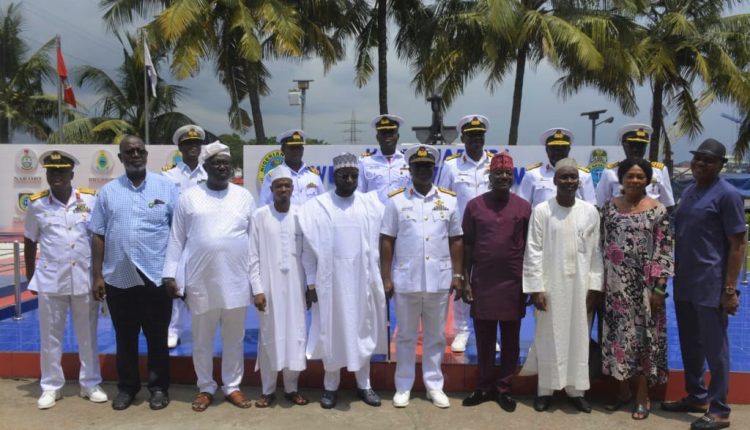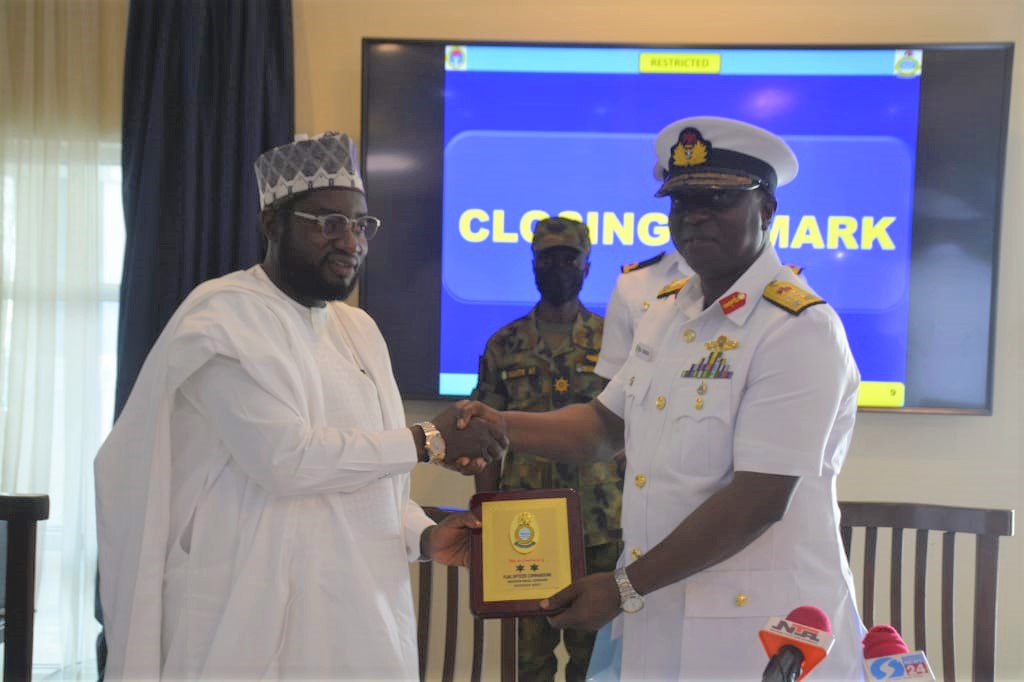The House Committee on the Navy on Friday said improved funding for the Nigerian Navy would surely enhance its operational effectiveness in maintenance of maritime security.
Speaking at a meeting with maritime stakeholders at the Western Naval Command, the Chairman of the Committee, Yusuf Gagdi, disclosed that the establishment of a Maritime Security Trust Fund, to which the NASS had passed a bill, would support the navy to boost its fleet of operational vessels and other logistical needs.

In that vein, Gagdi condemned a proposed bill aimed at establishing a coast guard for the purpose of maritime domain security.
According to him, the navy remains capable in its constitutional function of protecting the nation’s territorial integrity on water, therefore making a proposed coast guard for the same function a mere waste.
His words: “I am aware of some insinuations that some people are pushing in the National Assembly to establish a national Coast Guard. And I am of the opinion that the Navy should be funded to discharge its functions.
“You have not funded an agency effectively and you want to create another agency to waste tax-payers’ money without giving money for the agency that is supposed to do those functions.
“Until you give money and I don’t discharge my duties, you give me platform and I don’t use those platforms to discharge my duties effectively, then you will be talking of creating another agency that should help me in discharging my functions.
“As elected representatives of the people of Nigeria, we are most conscious of proliferation of agencies with multiplications of functions. And that is why before it came, my opinion is that coast guard is dead on arrival.
“Funding has been an issue, but without doubt, having visited all naval formations and command last year, we equally know that the Navy being the heartbeat of Nigerian economy requires a special fund and that is why the NASS has considered and passed a bill on Maritime Security Trust Fund for the Nigerian Navy to acquire platforms.
“The Trust Fund is expected to last for eight years, just like we have the Police Trust Fund, where money would be generated from some of the maritime activities as well as the consolidated revenue- 1 per cent of it. At the end of the day, if that trust fund comes to be, certainly, most of the platforms that the Nigerian Navy requires would be acquired.”
The Committee Chairman also called for inter-agency collaborations among agencies in the sector, to avoid unnecessary duplication of functions that amount to economic waste of time and resources.
He said: “There is a problem among the agencies. Each agency wants to do the function of one another; NIMASA wants to do the function of Navy, NPA wants to do the function of Navy. Until and unless these agencies in our waterways recognise the fact that the constitution donates Nigeria’s sea to the Nigerian Navy; because the primary responsibility of the Navy in the Constitution of the Federal Republic of Nigeria as an armed force of the nation, is to protect the territorial integrity by sea.”
Earlier, the Flag Officer Commanding, Western Naval Command, Rear Admiral Jason Gbassa, in his address, said that although there had been remarkable reduction in the occurrence of piracy in the Gulf of Guinea, as noted by the International Maritime Bureau, there were still challenges requiring immediate attention in order to support shipping operations within the nation’s waters.
He said: “Security in our maritime domain experienced a lot of improvements in the first three quarters of this year as compared to 2020. We have been able to record increased presence at sea, which were made possible by initiatives including the prompt allocation of petroleum oil lubricating products, availability of ships, which enhanced our operations and synergy with other stakeholders, as well as collaborations with foreign partners.
“These efforts have led to an all-time low in the incidence of piracy and sea robbery in the gulf of guinea for the first time in decades. In particular, Nigeria has recorded only four cases of piracy so far in 2021, and it is gladdening to note that just one occurred within the Western Naval Command area of responsibility.
“The International Maritime Bureau has noted this to be over 76 per cent reduction in the incidence of these crimes. Further to this, Nigeria has also transited from the Secure Anchorage Area regime hitherto operated by a private maritime logistics and security company, to the Lagos Anchorage Area policed by the Nigerian Navy. In conjunction with NIMASA and NPA, the Nigerian Navy has been able to effectively secure the anchorage area for our shipping activities.
“In as much as this remarkable achievements are heart-warming, the Nigerian Navy is not in any way resting on its oars, more so, efforts are on-going for the recapitalisation of the Nigerian Navy fleet. The effort is geared towards having the right fleet of ships for our tasks; including survey vessels to enhance our hydrography efforts as well as logistics platforms to effectively support our operations.
These achievements, notwithstanding, one of the prominent challenges facing the Command, is a lack of a dedicated holding bay for arrested vessels. This has made the administration of arrested vessels very cumbersome; the impact on manpower and other aspects of our operations are enormous.
“Additionally, many of the ships encountered at sea while on patrol, are usually found wanting for minor infractions such as switching off of their automatic identification system (AIS). Arresting such ships could be counter-productive in the long run, and leaving them would mean condoning impunity. Accordingly, efforts could be made to introduce administrative fine for such defaulters in our waters, to deter these practices.”
While addressing some of the issues that were raised, the Committee Chairman also spoke on the need to empower the navy to be able to prosecute maritime- related cases, in order to improve on the administration of justice, considering time frame.
The House Committee on Navy was on its oversight function.

































































